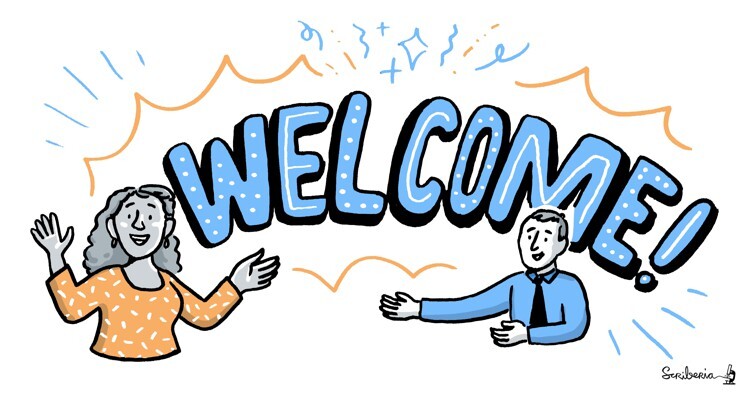
Welcome to The Turing Way Slack!¶
Not a member of our Slack workspace? You can join using the this link
Slack is one of our core communication channels within the The Turing Way community. It is a space where folks ask questions, learn about each other’s work, and get involved with The Turing Way and other projects. While it is not the only communication channel used by the community, it is a popular platform, increasingly used by remote teams around the world.
Here is a short guide to the default slack channels (meaning, you’ve already been added to them when you joined this space!):
- #announcements: Ping you about recurring community calls and community events (feel free to mute!)
- #ask-away: Use this channel to ask any question you might have - general or specific, and we’ll make sure to redirect you to the right resources
- #community: Topics related to the community, celebrations, collaborations, and other projects
- #general: For general-purpose conversations & questions
#github -related -posts: For chapter ideas and discussions, as well as ongoing projects within the github repository. #ideas -for -discussion: For discussion and ideas, related to the guides & otherwise - #introductions: Feel free to introduce yourself here!
- #random: For all other questions, comments not related to The Turing Way
- #welcome: A bot is installed in this channel, that tags you with a random greeting & flag to represent our global community :sparkles:
There are also a number of channels dedicated to specific types of work and questions within the community (all are welcome!):
- #accessibility: Join for discussions around accessibility practices within the community, and the upcoming work of a new working group
#environmental -sustainability: Join for discussions about environmental sustainability, co-hosted with the Environmental Data Science Book. - #translation: Join to learn about all things translation & localisation, as well as ongoing meetings and projects within the team
- #infrastructure: Learn more about project architecture, and get involved with technical infrastructure aspects of the project
#reviewers -editors -wg: Learn more about how to review & edit ongoing writing projects within The Turing Way #trainers -mentors -wg: Help to review ongoing promotion materials, and learn how how you can mentor other community members - #user-experience: Join the ongoing efforts around user experience and design within the community.
You might also be interested in joining the following channels:
- #en-español: Para hispanohablantes en la comunidad
- #events: for upcoming events in the open science network
#jobs -and -opportunities: for jobs, workshops, and other related opportunities #reading -recommendations: For reading recommendations from community members #research -data -management: For folks with an interest in research data management skills, practices, and tools.
We also have Slack channels dedicated to each guide:
#guide -for -collaboration #guide -for -communication - #guide-for-ethics
#guide -for -project -design #guide -for -reproducibility
If there are any other channels you’d like to see in the workspace, or ones that we use that you don’t see listed here – please feel free to correct this page by making an issue or pull request on Github.
Best Practices for using Slack¶
As with all of our communication channels, The Turing Way slack abides by our Code of Conduct.
We are in the process of developing platform-specific guidelines for Slack and other community platforms. While these are being developed, here are a few general guidelines to get you started:
- Images: Use alt text to describe images, diagrams, or other visuals (Learn more about how to do this in this tutorial.). Don’t forget to add important information like context in your description!
- Links: If you are inserting a link into a message, limit the number of embedded links within a message. Avoid embedding links within replies to messages when possible, as links posted within threads are not readable for screen readers.
- Emojis: Limit the use of emojis that break up narrative flows of information where possible (such as emojis listed between works). Remember that not all people are able to access the emoji reactions option within Slack, and use written affirmations as well!
- Bandwidth: In order to make sure that Slack is accessible in low-bandwidth environments for the community, avoid posting data-intensive content like videos directly into the channels. Instead, prioritise hosting the content on other platforms (such as YouTube), and sharing the link.
- Openness: Remember that not everyone in the The Turing Way community is in the Slack workspace – or on every social media channel. Where possible – especially when discussing chapter ideas and other collaborations – create issues and discussions on the Github repository or post across social media channels, in order to ensure the widest reach and participation possible.
In general, we encourage an approach to Slack that is as accessible as possible, for as many people as possible. Please practice kindness when you communicate with others, and be mindful of cultural, linguistic, disability, and individual differences that may affect how people communicate online.
Is there anything we are missing? Please reach out to the Research Community Manager Anne Lee Steele on Slack or by email at asteele@turing
Getting started with The Turing Way¶
- :books: If you want to dive right in to editing the book, check out a Pull Request or Issue on the Github repository. Use the tags to navigate through the issues and pull requests. Ones tagged
good first issueorgood first PRare a great place to start.
Don’t know where to start?¶
- Join us at an upcoming Onboarding Call - hosted every 2 months!
- Feel free to send me (Anne Lee Steele) a message on Slack or email at asteele@turing
.ac .uk if you have any questions or don’t know where to start. I’m the Community Manager (but just one of many leaders in this community), and here to help! - Join us at a Collaboration Cafe, which happen on a bi-monthly basis on Wednesdays to meet more members of the community, and learn more about the project.